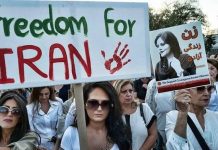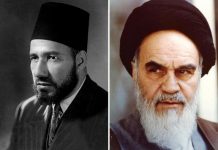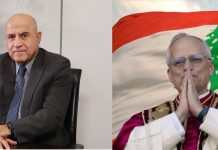Airspace fiasco sums up train wreck of a year for Lebanon
Michael Karam/The National/November 23/15
On Friday night I was in Malmo, south-west Sweden, when I received a call from an agitated Mrs Karam who told me that I wouldn’t be flying to Beirut on Sunday because … wait for it … the Russians had requested that Lebanon close its airspace for 72 hours. This was while it “conducted military manoeuvres”, which was presumably shorthand for sticking it to ISIS.
Surely not? Beirut airport is a crucial economic artery. Had Hizbollah, which doesn’t really care about such things and whose soldiers are fighting alongside Russian troops in Syria, applied pressure on the government of Tammam Salam? Not according to the local media, which was reporting that it was the Russian navy that had … again wait for it … “faxed” its intentions to the Lebanese civil aviation authorities, bypassing the seat of government completely. Curiously, the Russian ambassador to Lebanon announced that he knew nothing about it either.
One of the advantages of being a small and intimate nation is that we can still talk to humans and so I phone a friend who works for Middle East Airlines at Heathrow. She told me her phone had being ringing non-stop since the rumour broke, but the good news was that flights were leaving London on schedule. There had been no cancellations. Business class is fully booked and BA had not cancelled its flights to Beirut. Apparently we were just taking a different route into Beirut “as a precaution”.
I wasn’t entirely reassured but decided to go anyway. The confusion was yet another pathetic example of just how far adrift the Lebanese state has become from the rest of the country. No one in the government, as far as I could tell, had really “gripped” the situation.
The year 2015 will surely be remembered as a train wreck. A toothless state has not only showed it is supremely incompetent in the face of an environmental and health crisis of monumental proportions and a security lapse that led to the deaths of 40 civilians in a bomb blast in southern Beirut nearly two weeks ago, but the Salam government has added insult to injury by not even having the decency to step down in the face of its ineptitude.
But the year isn’t over yet. And just as the Lebanese were once again wondering who actually runs their country these days, the Free Patriotic Movement, Lebanon’s largest Christian political party, decided it would throw its weight around, when Simon Abi Ramia, one of its MPs, told the local media that his party would shut off the water supply to Beirut if work on a local dam project didn’t begin immediately. You couldn’t make it up.
The FPM rose to prominence in 2005 after the return of its founder, the former exiled army commander general Michel Aoun. The party promised transparency, vowing to fight corruption and as such appealed to many professional and educated Lebanese fed up with militia politics.
Not only is it now behaving like the political parties it swore to stand against, the party has also recently faced questions over the financial probity of its newly elected leader Gebran Bassil, who is also Lebanon’s foreign minister and Mr Aoun’s son-in-law. It also doesn’t help that the FPM also a staunch ally of Hizbollah.
It is one of the sad realities of Lebanon that even the brightest feel they have to belong to a political party and it is equally sad that the FPM’s supporters ended up backing the wrong party for the right reasons. They are one of the few vertebrae left in Lebanon’s increasingly brittle economic spine and they have a duty to ensure the country’s economy doesn’t disintegrate under the multiple pressures – external and internal – that it faces. Sticking with Mr Aoun and his dubious son-in-law is not helping the cause.
Thankfully we have heard nothing more from Mr Abi Ramia and in the end I made it to Beirut. On Sunday, the transport minister Ghazi Zeaiter revealed the Russians had decided not to hold naval manoeuvres after all and that in fact Russia never requested that Lebanon’s airspace be shut down. “Nobody would accept Lebanon’s airspace be [sic] closed,” Mr Zeaiter said solemnly.
Heaven forbid.
**Michael Karam is a freelance writer who lives between Beirut and Brighton.business@thenational.ae
http://www.thenational.ae/business/the-life/airspace-fiasco-sums-up-train-wreck-of-a-year-for-lebanon
The 2015 Independence Day festival in Beirut
Myra Abdallah/Now Lebanon/November 23/15
Sunday, 22 November 2015. Beirut’s Martyrs’ Square was full of life. People gathered to celebrate Lebanon’s Independence Day in a way that the Lebanese people have not witnessed in past years. For this occasion, various civil society organizations and groups formed since the garbage crisis emerged started calling for protests two weeks prior. They saw today as another opportunity to raise their demands. However, today’s protest was not like the protests of the past few months. Today, people were chanting and dancing. Children had their faces painted with the colors of the Lebanese flag — some wearing LAF fatigues — as they watched with stunned expressions clowns walking on stilts and riding unicycles. Some men sold fresh manakeesh and others pushed trolleys through the crowds, selling sweets and kaak. “It is the first year I feel that I am participating in Independence Day,” said Maryam, 29. “Before, Independence Day was all about a military show where Lebanese officials gather to watch it and the Lebanese people stay home and watch it on television. It used to be a day for the politicians. This year, I feel that Independence Day is ours — it belongs to the Lebanese people now, and this is how it should be.”
A festival of demands
“We would also like to welcome You Stinkand We Want Accountabilityfor deciding to join our protest,” said the official statement of the protesting organizations. In fact, every civil group had a different activity. Offre Joieorganized a march from Baabda, near the presidential palace, towards Martyrs’ Square chanting the slogan: “Cancel the celebration, we are the independence.” You Stink called for a protest in Martyrs’ Square using the slogan: “To be independent from your exploitation.” Leave Us Alonechose to protest for “The Real Independence.”
We Want Accountabilityorganized the “Independence March” from Beirut’s National Museum towards Martyrs’ Square. Other groups were also present and raised banners, each related to their organization’s cause. In parallel, the Kataeb Party had an independence activity as well, gathering at party headquarters in Saifi and marching towards Martyrs’ Square demanding the election of a president. A lot of demands were raised, such as the right for women to give Lebanese nationality to their children, a decent health system, an independent judiciary system, fighting corruption, and the right to free education, among others. Other people who were not related to any of the organizing groups also participated and had many demands. “I do not belong to any organization,” said Abu Samir, who is in his late 50s. “I came to demand that the government establish a system that will offer job opportunities to the Lebanese youth.
I came to demand this in order to be able to convince my children to come back to Lebanon. I have two boys. One of them is 27 and living in Saudi Arabia and the other is 24 and living in Qatar. They went there because they can work with good salaries and left me here alone. I want them to come back — this is why I am here today.”“My husband is Egyptian and I am Lebanese,” Samira, who held a Lebanese flag and had her children with her, told NOW. “I did not come here to demand anything. I lost hope that anything can be done. I am only here because my children, who are seven and 10, were very excited to participate in Independence Day. They had several activities at school and wanted to come here today. It is a sunny day, so I brought them here to have some fun.”
Security
“Habibi,Hassan, don’t do this — we don’t want any trouble today. Let’s keep it peaceful,” said Fatima, a veiled woman in her 80s, to Hassan, who was trying to climb a building under construction where the ISF banner hung in order to tear it down. Hassan and his friend went up to the second and third floor of the building to remove the banner, which read: “From you, For you, To protect you.” Fatima was with the majority of the participants — few were looking for trouble that might ruin the day.
While Hassan and his friend climbed the building, ISF officers watched as if nothing was going on. They later asked them gently to come down. It was obvious that neither the participants nor the security forces had planned wanted any kind of confrontation. It was meant to be a peaceful independence celebration. However, when this incident took place, people with kids tried to move away quickly. “I am here with my wife and children. I do not want them to get hurt if anything happens and we are never sure when things will go wrong. Sometimes the biggest fights can take place just because of a wrong word said,” a man named Melhem told NOW. But there were no security issues at this protest. Not only did none of the participants trigger a fight with the police but the number of police officers was not big and the riot police present were not geared up for a confrontation.
People still have hope
“At our age, we are stupid to keep hoping to see our country independent. But we do,” said two women in their late 60s who were sitting on the curb and smoking cigarettes. “We’ve experienced all types of crises,” one of them told NOW. “We protested for years — we always hoped for the better. Every new government gave us new hope and we thought it would be different from the one before it, and try to solve the country’s problems, but all of them disappointed us. However, it is our beloved country and we do not have any other choice. We still have hope.”





















